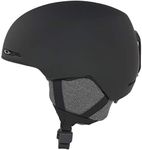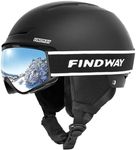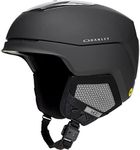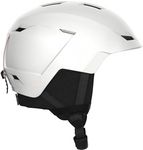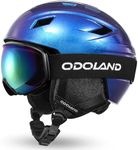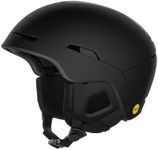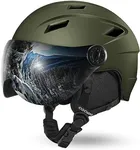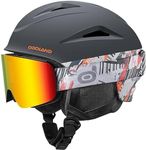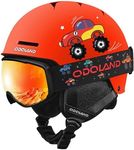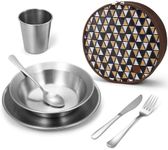Buying Guide for the Best Ski Helmets
Choosing the right ski helmet is crucial for ensuring safety and comfort on the slopes. A good ski helmet not only protects your head from potential injuries but also provides warmth and can enhance your skiing experience. When selecting a ski helmet, consider factors such as fit, safety certifications, ventilation, and additional features that suit your skiing style and conditions. It's important to try on different helmets to find the one that fits snugly and comfortably, as a proper fit is essential for effective protection.FitThe fit of a ski helmet is perhaps the most important factor to consider. A helmet that fits well will stay securely in place and provide the best protection. Helmets typically come in different sizes, and some offer adjustable systems to fine-tune the fit. To find the right fit, measure the circumference of your head and compare it to the helmet's size chart. The helmet should sit snugly on your head without being too tight, and it should not move when you shake your head. A well-fitting helmet will feel comfortable and secure, allowing you to focus on skiing.
Safety CertificationsSafety certifications indicate that a helmet has been tested and meets certain safety standards. Common certifications for ski helmets include ASTM F2040, CE EN1077, and Snell RS-98. These certifications ensure that the helmet can withstand impacts and provide adequate protection. When choosing a helmet, look for one that has at least one of these certifications. This will give you confidence that the helmet is designed to protect you in the event of a fall or collision.
VentilationVentilation in a ski helmet helps regulate temperature and prevent overheating. Helmets can have fixed or adjustable vents. Fixed vents provide constant airflow, while adjustable vents allow you to control the amount of air coming in, which can be useful in varying weather conditions. If you tend to ski in warmer climates or engage in high-intensity skiing, you might prefer a helmet with more ventilation options. Conversely, if you ski in colder conditions, fewer vents might be more suitable to retain warmth.
WeightThe weight of a ski helmet can affect comfort and performance. Lighter helmets are generally more comfortable to wear for extended periods and can reduce fatigue. However, they may be more expensive due to the materials used. Heavier helmets might offer more durability and protection but can be less comfortable over time. Consider how long you typically ski and your comfort preferences when choosing the weight of your helmet.
Additional FeaturesAdditional features in ski helmets can enhance your skiing experience. Some helmets come with built-in audio systems, goggle clips, or removable liners. Audio systems allow you to listen to music or communicate with others while skiing. Goggle clips help keep your goggles secure, and removable liners make it easier to clean the helmet. Consider which features are important to you based on your skiing habits and personal preferences. These features can add convenience and enjoyment to your time on the slopes.


